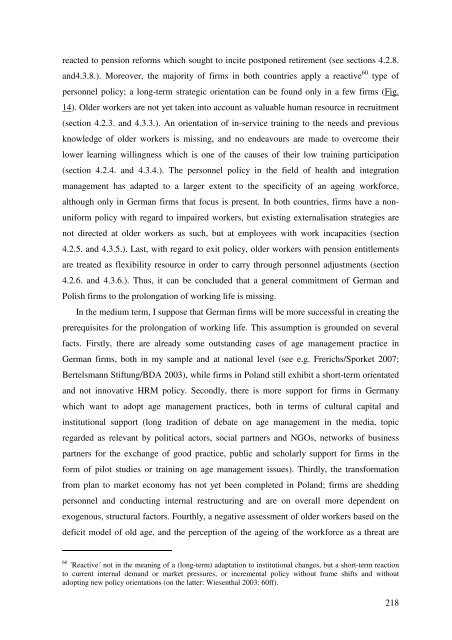Dissertation_Paula Aleksandrowicz_12 ... - Jacobs University
Dissertation_Paula Aleksandrowicz_12 ... - Jacobs University
Dissertation_Paula Aleksandrowicz_12 ... - Jacobs University
Create successful ePaper yourself
Turn your PDF publications into a flip-book with our unique Google optimized e-Paper software.
eacted to pension reforms which sought to incite postponed retirement (see sections 4.2.8.<br />
and4.3.8.). Moreover, the majority of firms in both countries apply a reactive 60 type of<br />
personnel policy; a long-term strategic orientation can be found only in a few firms (Fig.<br />
14). Older workers are not yet taken into account as valuable human resource in recruitment<br />
(section 4.2.3. and 4.3.3.). An orientation of in-service training to the needs and previous<br />
knowledge of older workers is missing, and no endeavours are made to overcome their<br />
lower learning willingness which is one of the causes of their low training participation<br />
(section 4.2.4. and 4.3.4.). The personnel policy in the field of health and integration<br />
management has adapted to a larger extent to the specificity of an ageing workforce,<br />
although only in German firms that focus is present. In both countries, firms have a nonuniform<br />
policy with regard to impaired workers, but existing externalisation strategies are<br />
not directed at older workers as such, but at employees with work incapacities (section<br />
4.2.5. and 4.3.5.). Last, with regard to exit policy, older workers with pension entitlements<br />
are treated as flexibility resource in order to carry through personnel adjustments (section<br />
4.2.6. and 4.3.6.). Thus, it can be concluded that a general commitment of German and<br />
Polish firms to the prolongation of working life is missing.<br />
In the medium term, I suppose that German firms will be more successful in creating the<br />
prerequisites for the prolongation of working life. This assumption is grounded on several<br />
facts. Firstly, there are already some outstanding cases of age management practice in<br />
German firms, both in my sample and at national level (see e.g. Frerichs/Sporket 2007;<br />
Bertelsmann Stiftung/BDA 2003), while firms in Poland still exhibit a short-term orientated<br />
and not innovative HRM policy. Secondly, there is more support for firms in Germany<br />
which want to adopt age management practices, both in terms of cultural capital and<br />
institutional support (long tradition of debate on age management in the media, topic<br />
regarded as relevant by political actors, social partners and NGOs, networks of business<br />
partners for the exchange of good practice, public and scholarly support for firms in the<br />
form of pilot studies or training on age management issues). Thirdly, the transformation<br />
from plan to market economy has not yet been completed in Poland; firms are shedding<br />
personnel and conducting internal restructuring and are on overall more dependent on<br />
exogenous, structural factors. Fourthly, a negative assessment of older workers based on the<br />
deficit model of old age, and the perception of the ageing of the workforce as a threat are<br />
60 ´Reactive´ not in the meaning of a (long-term) adaptation to institutional changes, but a short-term reaction<br />
to current internal demand or market pressures, or incremental policy without frame shifts and without<br />
adopting new policy orientations (on the latter: Wiesenthal 2003: 60ff).<br />
218
















